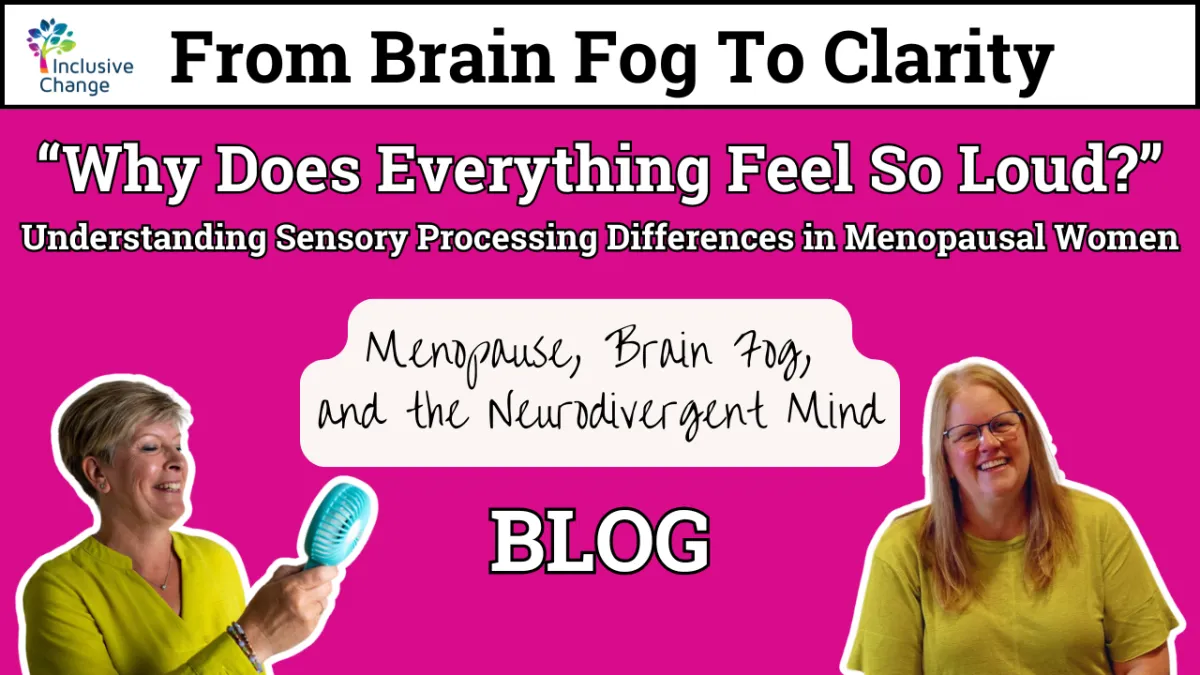Inclusive Change
Start the conversation
Read our blogs and discover more about neurodiversity through our links


“Why Does Everything Feel So Loud?” - Understanding Sensory Processing Differences in Menopausal Women
Do you suddenly find yourself avoiding busy supermarkets? Do certain fabrics feel unbearable? Are everyday sounds making you irritable or even panicked?
You’re not becoming fussy. You’re likely experiencing sensory processing sensitivity - something that’s common in autistic and ADHD women, especially during menopause.
What Is Sensory Processing?
Sensory processing is how your brain interprets information from your environment. This includes:
•Noise
•Light
•Touch
•Smell
•Temperature
•Movement
If you’re neurodivergent, your brain might process this input more intensely or less consistently than neurotypical brains.
Sensory Profiles in Autism and ADHD
•Autistic women often have heightened sensitivity (hyper-sensitivity) or low registration (hypo-sensitivity) to specific sensory inputs.
•ADHD women may swing between seeking stimulation and feeling overwhelmed by it—especially when already tired or dysregulated.
Why Menopause Makes It Worse
Hormonal fluctuations can:
•Increase sensory sensitivity
•Lower your tolerance for noise and chaos
•Disrupt your body’s ability to regulate temperature, touch, and comfort
•Affect your ability to 'filter out' background sensations
Real-Life Signs
•Getting physically uncomfortable from certain clothes or materials
•Avoiding certain lighting or sounds
•Experiencing 'sensory shutdown' after a long day
•Finding it hard to focus in cluttered or noisy environments
What Helps
•Dress for comfort, not conformity
•Use ear defenders or noise-reducing headphones
•Create calm, low-stimulation zones in your home or workspace
•Schedule quiet recovery time after high-input situations
•Advocate for sensory-safe environments at work
You’re not overreacting. You’re overwhelmed. And it’s valid.
Want more insight into how menopause affects your sensory system and nervous system regulation? That’s exactly what we unpack in our workshop and coaching spaces.
Come join us:
Check out Lucy's other features

A Journey of Neurodiversity Advocacy and Change
Read Lucy's interview with Golden Valley, where she explains some of the life events that led her to becoming a full time advocate for neurodivergent and disabled people in the workplace.

Women in the Middle® Entrepreneurs:
EP #52: Sharing the Positives About Neurodiversity with Lucy Smith
Suzy Rosenstein, a master life coach, hosts a podcast called Women in the Middle Entrepreneurs, a podcast where these important conversations about the intersection of being a midlife entrepreneur who's also a woman 50 plus can happen.
Inclusive Change Ltd
The Brightwell, Bradbury House
Wheatfield Drive
Bradley Stoke, Bristol
BS329DB
Copyright 2025 - Inclusive Change Ltd
Companies House: 12412464
VAT NO: 352 1564 17
ICO Reg: ZB081779
UK Register of Learning Providers: 10090652
Reg no: 12412464




